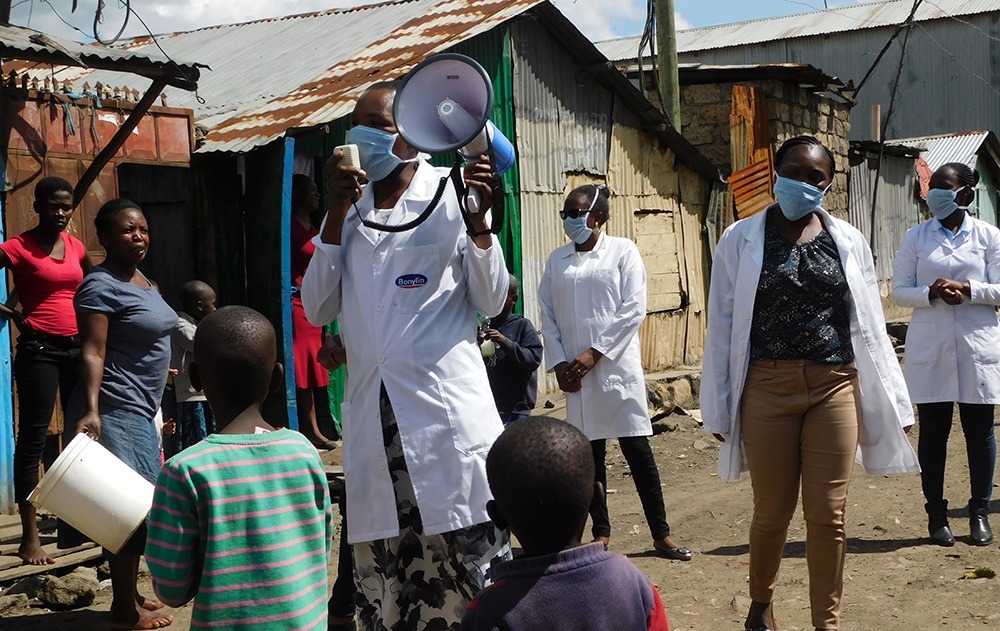
Nearly a year after the pandemic first hit Kenya, the country has reported 113,236 infections and 1,913 coronavirus-related deaths. The actual numbers are likely to be higher. It is leading the other East African Community states, such as Uganda, Tanzania and Burundi. It's a good time to reflect on how the country dealt with the pandemic since the first case was reported on March 13, 2020. Crucial to this has been the relationship between the state and the church, with religious leaders refusing to obey government regulations and putting the people at risk.
When Kenya’s first case of Covid-19 was announced on March 13th, 2020, it was met by the country as a surprise declaration of war against “God’s Kingdom and its people”. While President Uhuru Kenyatta formed a task-force made up of health experts to monitor the pandemic and guide the country on measures to control infection, spiritual leaders of all faiths offered various interpretations. Encouraging their followers to pray hard, Christian leaders such as Cardinal John Njue of the Catholic Church, and Marc Kariuki of the Deliverence Church of Kenya, also termed the pandemic a “devil’s attack” on the “Kingdom of God Jehovah”.
A few days later, Kenya banned all international flights, except for cargo, and introduced a work from home policy and mandatory 14-day quarantine, for people entering the country, at their cost. It also imposed lockdown and a nationwide curfew to curb the spread of the virus. Churches, along with schools, hotels and bars, were closed indefinitely and face masks in public places became mandatory.
However, Christian and Muslim religious leaders did not welcome the banning of prayers. Instead, they demanded exemption for all forms of religious meeting, under self-regulation protocols. As they were not granted this, many churches reverted to clandestine prayer meetings. Preachers of all faiths and their followers have since been arrested and charged in the courts, with some cases gaining national and global attention, such as that of Fr. Richard Oduor of the Catholic Church, who was arrested and charged in a Nairobi court in April of last year for “negligently spreading an infectious disease”.
Violations of restrictions in Kenya carry a minimum fine of Kes20,000 ($200), six months in jail, or both, enforced by the Kenyan police. Those who could not raise the fine were forced to do manual jobs in the community. Christians in Nakuru have used the caves at the Menengai Crater as prayer sanctuaries and to avoid arrest. Faith leaders and their followers have also spread false stories about the virus. A protestant bishop of the Full Gospel Church of Kenya said that Satan, supported by the police globally, had attacked Jehovah’s Kingdom. He called on the state to keep the police away from places of prayers. The bishop said a spiritual war is fought spiritually not by the military or the police: “We have enough faith to win the war without using the police.”
As the war between the churches and the state continued, the economy was suffering as production, marketing and shipment of commodities – such as tea, flowers and coffee – were grounded, and thousands of workers sent home. The tourism sector has also shrunk, due to the closure of hotels and banning of international flights. Many parts of the country experienced food shortages. Uganda, which supplies a lot of Kenya's food, closed its borders with us, causing further shortages of essential commodities. Prices more than doubled, adding more misery.
Bishop Anthony Kamau, of Jesus International Ministry, sees all this suffering as God’s self-manifestation before mankind to prove that He (God) is the super power on Earth and in Heaven. “Every person in the world, including the powerful nations, is helpless crying for God’s mercy,” he said. Meanwhile, many churches are broke, with no money to pay their priests, as the offerings that were key sources of their income have been blocked due to the ban of church gatherings.
Kenya has now started to reopen its economy in phases, but with restrictions. Schools were opened in two phases, in October and in January. As for places of worship, the government has set a maximum of 150 people per service and limited the duration to no more than one and half hours. A religious advisory committee has also been created, made up of faith leaders from the Christian, Muslim and Hindu faiths, to advise the government on the correct protocols for religious services.
Should Kenyans be taking their advice? If the church leaders had less power, they would not have driven so many of their followers to become infected, endangering the population at large. While the Kenyan state has more control over the general population than priests and imams, this pandemic has shown that a significant proportion of religious leaders will not necessarily obey the state, or protect the population from death and disease.

